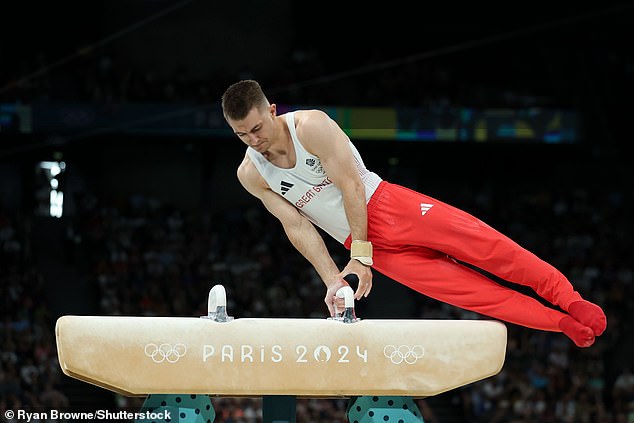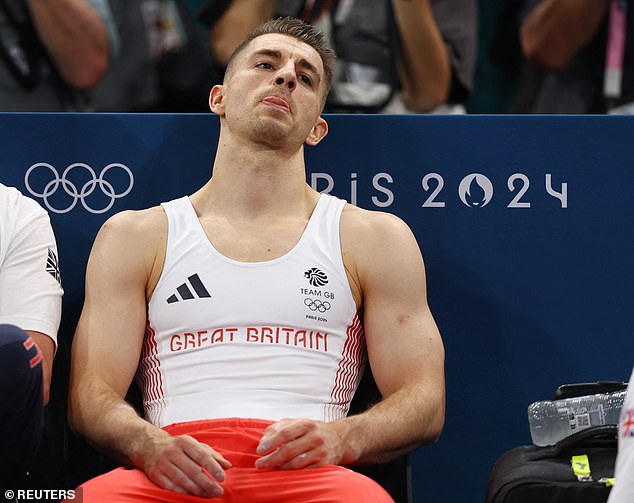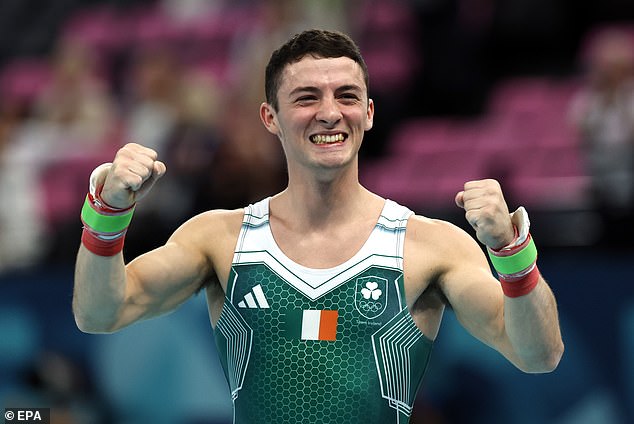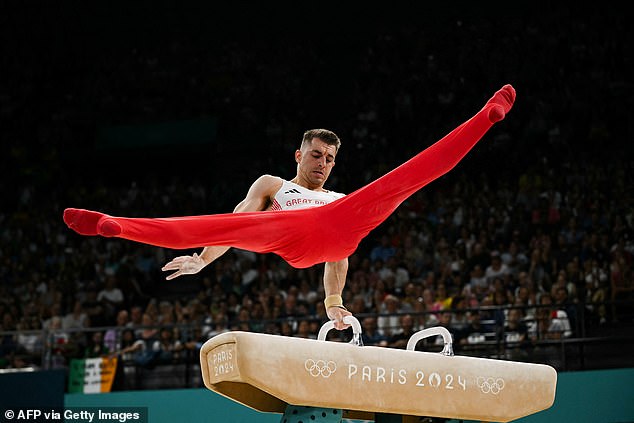Max Whitlock’s finale ends in tears as legendary Team GB Olympian falls short on pommel horse in last display before retirement – as Ireland’s Rhys McClenaghan wins gold
Amid the cheers, the voice of a child could clearly be heard as Max Whitlock gave his final 90-second performance of a career for which he will be remembered as one of Britain’s greatest Olympic athletes.
Whitlock has revealed that his five-year-old daughter Willow likes to encourage him in unexpected ways when he competes. Although he was too preoccupied with the task at hand to hear, the opportunity added to the searing intensity of the gymnast’s latest, deceptively brief performance.
When Andy Murray made his final stand in this city on Thursday, he had an hour or so to rage against the dying of the light. But the hunt for glory on the pommel horse is over before you know it, and with it comes terrible dangers.
As Whitlock grabbed the equipment, he saw that an athlete five years his junior, who had just competed, had recorded a score that would make it even more difficult to retain the gold.
He knew the younger men – Ireland’s Rhys McClenaghan, who won gold, and Kazakh Nariman Kurbanov, who threw down the gauntlet to claim silver – would be breathing down his neck. He would make an early appearance, with all the complications that entailed.
Team GB’s Max Whitlock missed out on final Olympic medal on pommel horse in Paris

Whitlock’s score of 5.2 was not enough as he was overtaken by his younger competitors
Whitlock always enters the competition with three possible routines, performing the one his coach, Scott Hann, who measures the other scores, deems necessary for victory. In the 2016 Rio final, as the penultimate performer, he controlled his own destiny.
But when you’re performing ahead of the rest of the field, as Whitlock did when he won in Tokyo, you have to play “big” in the hope of getting a points total that no one else can match. “When you’re in a strong final early on, it’s almost like you don’t have many choices,” he said Saturday night.
He just couldn’t reach the technical level this time. There were mistakes – legs sometimes not quite as straight as they could have been and other barely visible imperfections – in the moments of extra difficulty he had added. There was not quite the old energy. Gradually the field pushed him out to finish fourth. If he had repeated his score of 15.582 in Tokyo, he would have retained his title. He scored 5.2.

The result left Whitlock devastated, but he will be remembered as one of Britain’s greatest Olympic athletes

Ireland’s Rhys McClenaghan won the gold medal, beating Whitlock in his very last Games

Whitlock could not reach the technical level, because small mistakes crept into his performance
The result left him a broken man. He closed his eyes and took a moment to collect himself, not wanting to sink into the flood of tears that sometimes welled up in his eyes when he spoke. “Looking back on it now, there were a few mistakes that I would be a little bit devastated about and would have liked to have cleaned up,” he said. “It is what it is. I don’t really know what to say. I’m sorry. I’m a little bit upset.”
He was 31 years old and competing in a younger man’s game, but that wasn’t how he saw it when, after taking a break from the sport after the pressures of Tokyo had taken their mental toll, he decided to give the Olympics one last try. He wanted to compete in an Olympics where his wife, Leah, and Willow could be there. “I’m proud that I did,” he said.
Britain did win one medal. Jake Jarman won bronze in the individual floor final after also setting himself a high standard of difficulty but failing to execute his landings like gold-winning Filipino gymnast Edriel Yulo. But it was Whitlock the arena was expecting. They even put on a career-highlight roll before he showed up.
He tried to find solace at the end of it all. ‘If you go back to before 2012, when I was 19, I really, really, really dreamed that I would win a medal. I didn’t know how possible it was. To be here – and I’m done now – I can be really happy.’
When peace has returned, there can be real satisfaction for one of the most stylish and graceful athletes of the past 12 years of uninterrupted success at the British Olympic Games.
Since he and Louis Smith battled for Olympic gold, he has changed the way gymnastics is viewed and inspired thousands to take it up. He said his goal now is to improve access to the sport. ‘The way gymnastics is in schools – I want to change that. At grassroots level I want to change the sport for the better.’
But as he walked into history, it was hard not to think back to a conversation with him in Tokyo, in which he remarked that he wanted gold so badly that it hurt. “That feeling of winning gold is crazy and you want to experience it again,” he noted. That sentiment still holds true. It will take some time for the pain to subside.
